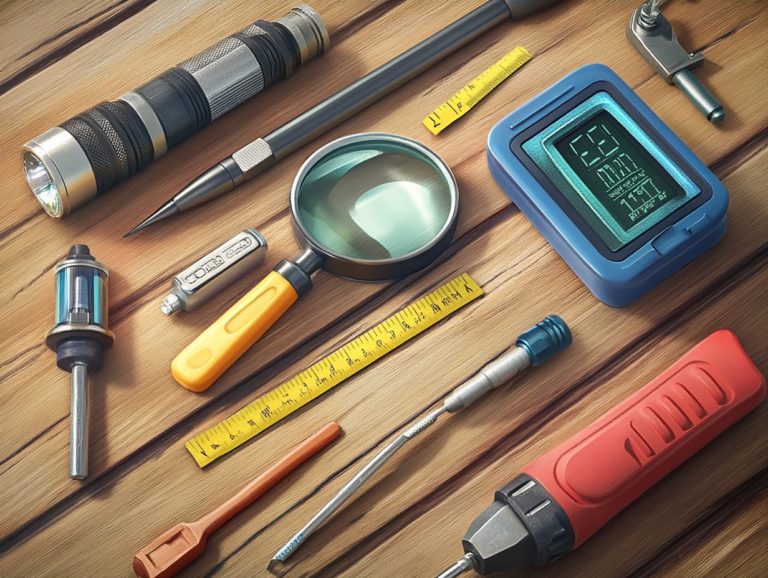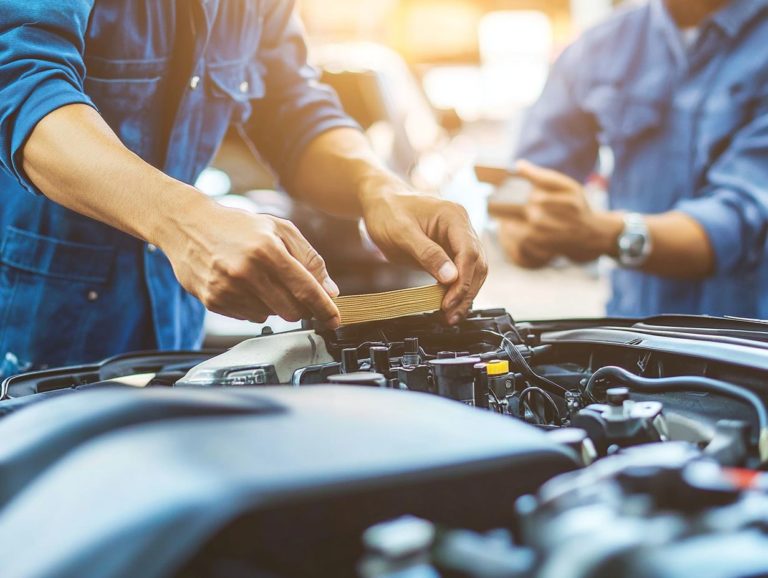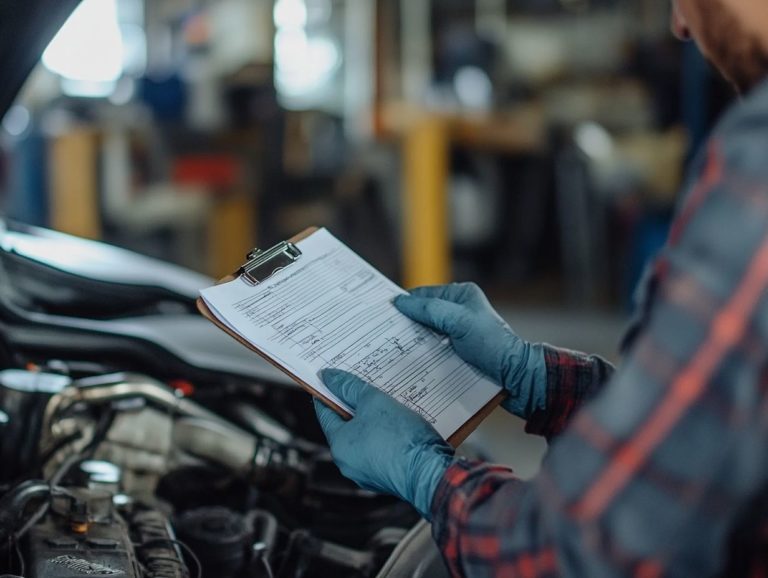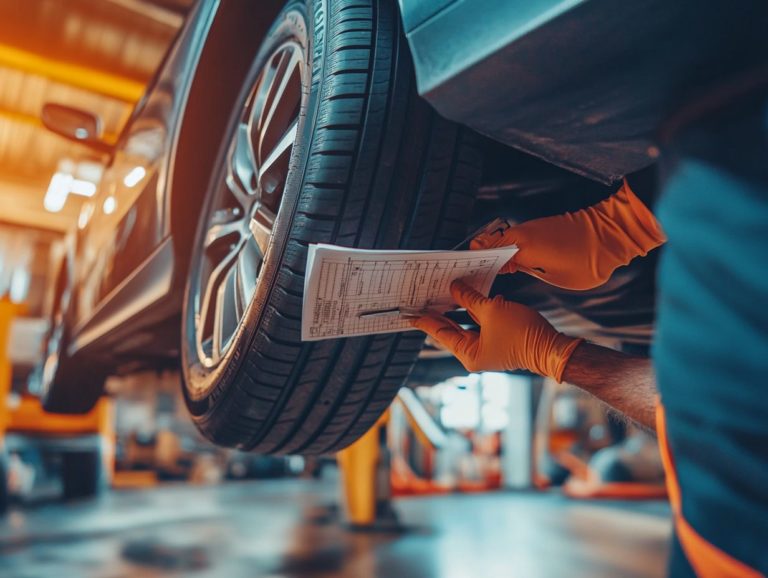The Role of a Mechanic in Car Inspections
Car inspections are essential for your safety and that of others on the road. Regular vehicle inspections help you spot potential issues early, such as parts that need fixing, that could jeopardize your safety.
Following the inspection requirements set by the Department of Motor Vehicles (DMV) and leveraging NHTSA data allows you and your trusted local mechanics to ensure that your vehicle runs optimally and securely. Being proactive can prevent accidents and keep you safe on the road while also extending the lifespan of your vehicle.
During these inspections, addressing details like windshield cracks is vital since they can significantly obstruct your view. The mechanic checks your tires to ensure they are safe, examining their tread depth and inflation, both crucial for maintaining traction and handling.
Brake performance is another key focus area; effective brakes are essential for safe stopping distances. Regular inspections enhance your vehicle’s reliability, preventing unfortunate incidents and helping maintain higher resale values.
Additionally, following state inspection requirements keeps you compliant with legal mandates, shielding you from fines and contributing to the overall safety of the roads you travel.
Contents
- Key Takeaways:
- Types of Car Inspections
- Common Issues Found During Inspections
- How to Prepare for a Car Inspection
- Tips for Choosing a Reliable Mechanic
- Preguntas Frecuentes
- Cu l es el papel de un mec nico en las inspecciones de autom viles?
- Cu les son algunas responsabilidades clave de un mec nico durante una inspecci n de autom vil?
- Por qu es importante que un mec nico realice una inspecci n de autom vil?
- Cu les son algunos problemas comunes que un mec nico puede encontrar durante una inspecci n de autom vil?
- Cu nto tiempo tarda t picamente un mec nico en completar una inspecci n de autom vil?
- Puede un mec nico recomendar reparaciones o mantenimiento durante una inspecci n de autom vil?
Key Takeaways:
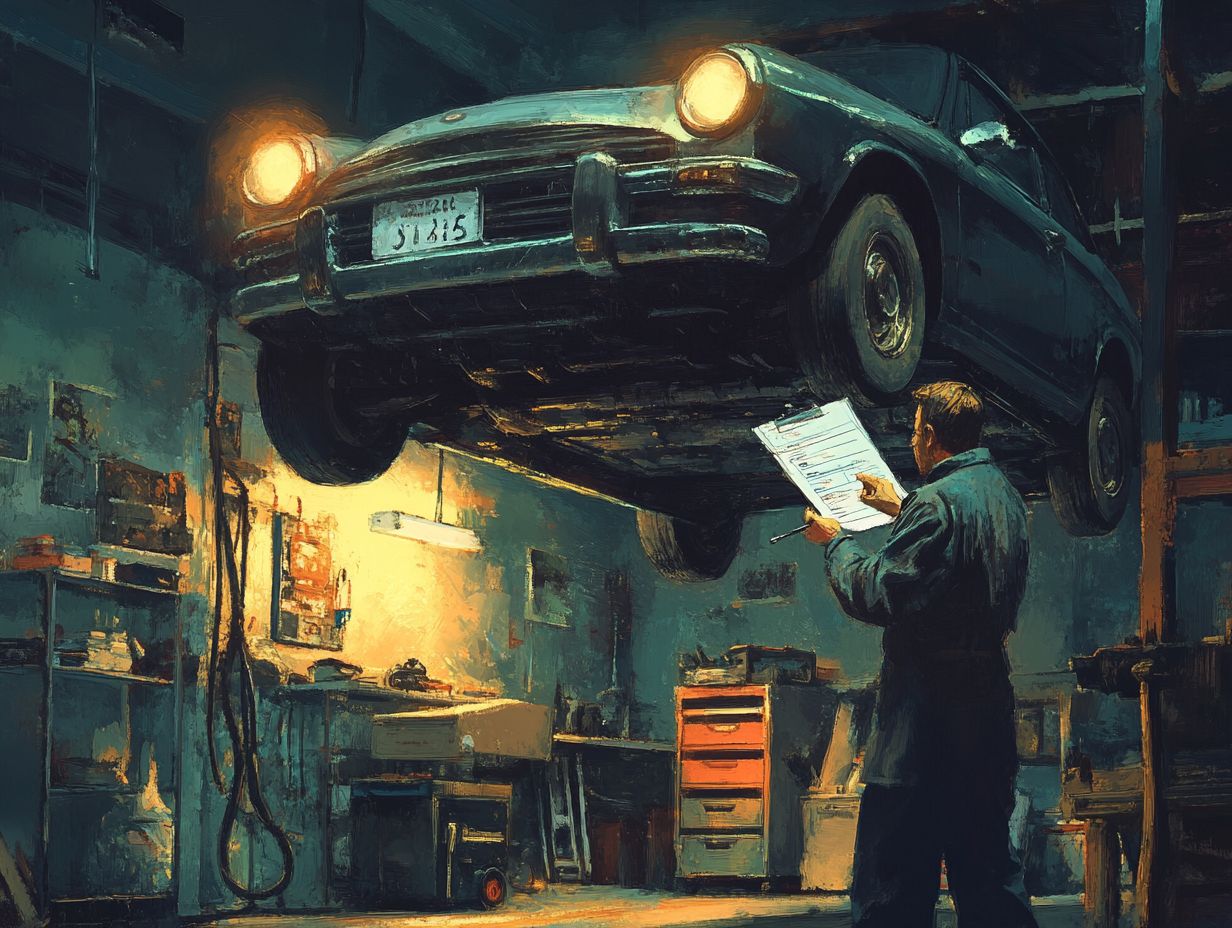
1. A mechanic plays a crucial role in car inspections by thoroughly checking for mechanical issues and safety concerns, which is part of understanding the car inspection process.
2. Having a qualified mechanic conduct inspections ensures accurate and reliable results.
3. There are various types of car inspections, including pre-purchase and regular maintenance, each serving different purposes.
Why Car Inspections are Important
A local mechanic serves as a crucial ally in conducting thorough vehicle inspections, playing a pivotal role in ensuring automotive safety and performance.
They evaluate key mechanical components of your car, providing not just a detailed inspection but also invaluable repair advice based on their findings. With their expertise, you can rest assured that each safety inspection adheres to DMV regulations, allowing them to identify potential issues that could impact your vehicle’s operation on the road.
What a Mechanic Checks During an Inspection
During a car inspection, you can expect the mechanic to meticulously scrutinize a range of mechanical components to ensure your vehicle meets essential safety and operational standards. They ll focus on key areas such as tire condition, light functionality, and brake performance, making sure everything is in proper working order and adheres to safety inspection regulations.
Other critical checks include:
- Steering alignment
- Seat belt functionality
- The identification of any fluid leaks or exhaust emissions that could pose risks to both you and the environment
The inspection will also delve into windshield integrity, as any cracks can significantly impair visibility and compromise your safety. A thorough suspension check is equally essential, ensuring that your vehicle maintains the right handling characteristics and ride comfort.
The mechanic will examine the axle frame to identify any structural weaknesses that might have developed over time, which could threaten your vehicle s performance. Each of these inspections is vital not just for regulatory compliance but also for safeguarding everyone on the road.
Neglecting any of these components could lead to costly repairs later on and, more importantly, put lives at risk.
Don t wait until it s too late! Schedule your car inspection today and keep your vehicle in top shape!
Importance of Having a Qualified Mechanic
Having a qualified mechanic conduct your car checks is crucial for ensuring that all safety standards and regulations are met. This ultimately protects both you and your passengers.
With their expertise, a skilled mechanic can effectively identify potential issues that may lead to unsafe driving conditions. They can also offer informed repair tips to address those concerns.
Their thorough safety inspections guarantee that your car remains roadworthy and complies with the rules set by the Department of Motor Vehicles (DMV).
These professionals are also trained to understand the nuances of different car makes and models. This allows them to spot minor problems before they escalate into major repairs.
Engaging a qualified mechanic not only enhances the longevity of your vehicle but also contributes to overall road safety.
Trust their knowledge to boost your confidence in your car! You can enjoy a smoother, safer drive.
Many mechanics provide detailed assessments that help you prioritize repairs. This enables you to manage your budget effectively while keeping your car in good condition.
Types of Car Inspections
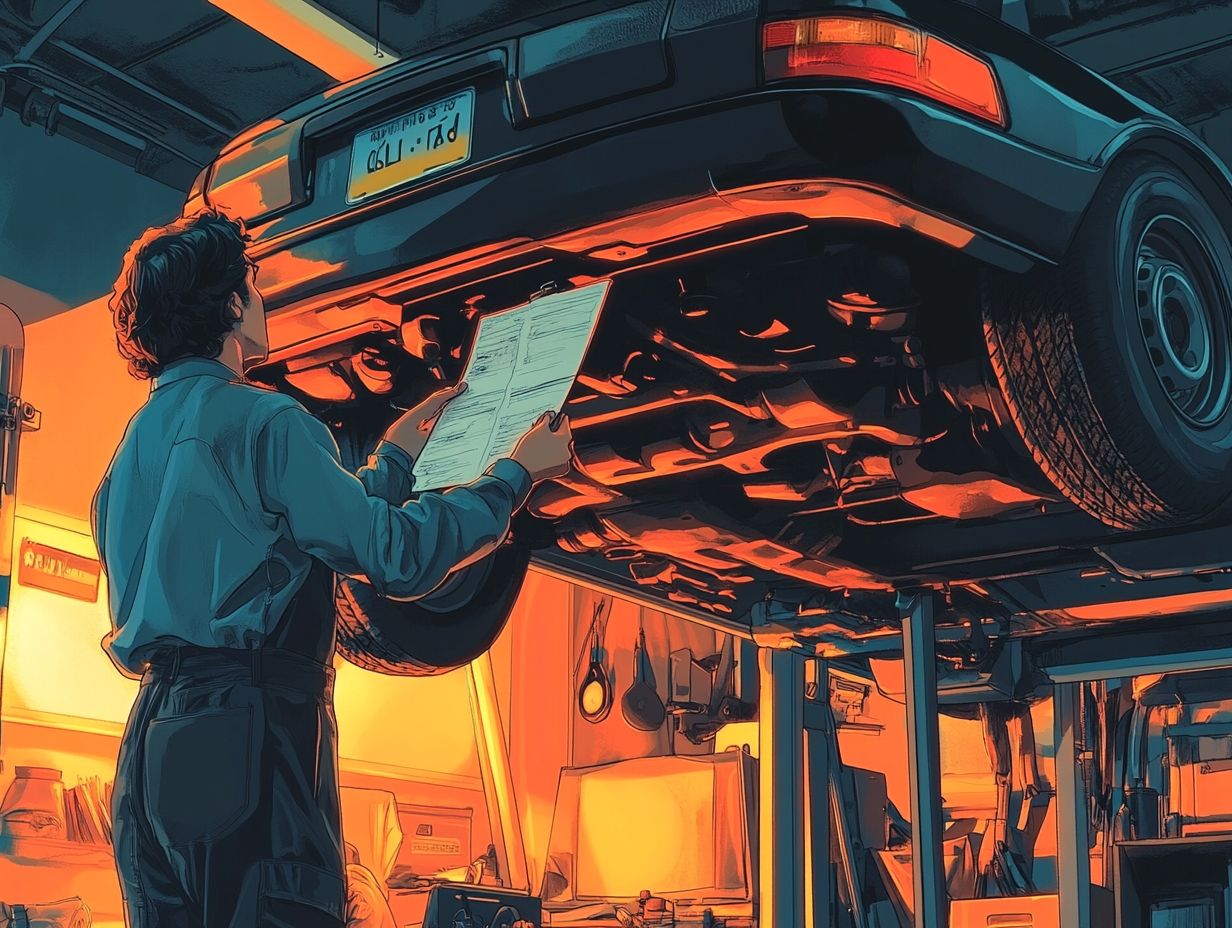
Car inspections come in a variety of types, each tailored to uphold your car’s safety and performance.
Regular maintenance inspections are essential for ensuring that your car operates at its best over time.
Then there are pre-purchase inspections, which provide a thorough evaluation of a car’s condition before you commit to a purchase.
By grasping the different types of car checks, you enable yourself to make informed choices that enhance your safety and protect your investment.
Pre-Purchase Inspections
Pre-purchase inspections are essential evaluations you should consider before acquiring a car. They offer you invaluable insights into the car’s condition.
This type of inspection focuses on verifying the integrity of car parts and ensuring compliance with safety standards. This can significantly influence your decision-making process.
By conducting a thorough pre-purchase inspection, you can pinpoint issues like windshield cracks or brake performance concerns that might need immediate attention.
Act now to dive into critical areas like the engine’s health, transmission functions, suspension integrity, and overall structural soundness.
It’s crucial to inspect safety features such as airbags and seatbelts to ensure the car meets current safety regulations, ultimately providing you with peace of mind.
A detailed report from the inspection can uncover hidden defects, enabling you to negotiate more effectively or reconsider your investment altogether.
This proactive approach not only shields you from unexpected repair costs but also instills a sense of responsibility for your future vehicle ownership.
Regular Maintenance Inspections
Regular maintenance inspections are crucial for keeping your car in peak operating condition throughout its lifespan.
These inspections enable you to stay ahead of potential issues, allowing for timely repairs and ensuring compliance with safety regulations.
By routinely checking important components like tire condition, fluid leaks, and exhaust emissions, you can maintain your car s performance and safety on the road.
These proactive steps are key in spotting mechanical issues before they snowball into costly repairs or dangerous breakdowns.
Regular inspections not only boost fuel efficiency but also extend the life of your car, saving you money over time.
By prioritizing safety inspections, you can enjoy peace of mind knowing your car is less likely to experience unscheduled outages or fail critical performance tests.
This approach enhances your driving experience and promotes safety for everyone on the road.
Common Issues Found During Inspections
During car checks, you may encounter common issues that can significantly affect both safety and performance.
Mechanical problems like brake performance issues, tire wear, and fluid leaks often come to light, raising valid concerns about your car’s reliability.
Additionally, safety aspects such as seat belt functionality and light malfunctions can present serious risks to drivers and passengers, underscoring the need for immediate attention.
Mechanical Problems
Mechanical problems are among the most critical issues during vehicle inspections. They impact safety and functionality, so you must address concerns like brake performance, fluid leaks, and engine alerts.
Understanding these issues helps you take proactive steps. For instance, poor brake response can come from worn parts or low fluid levels, drastically affecting your stopping ability.
Fluid leaks from the engine or transmission can cause severe damage if not fixed quickly. Engine alerts might point to minor sensor issues or serious fuel system problems, both affecting your vehicle’s performance.
A thorough inspection can reveal these problems early. Timely action ensures your safety and the longevity of your vehicle.
Safety Concerns
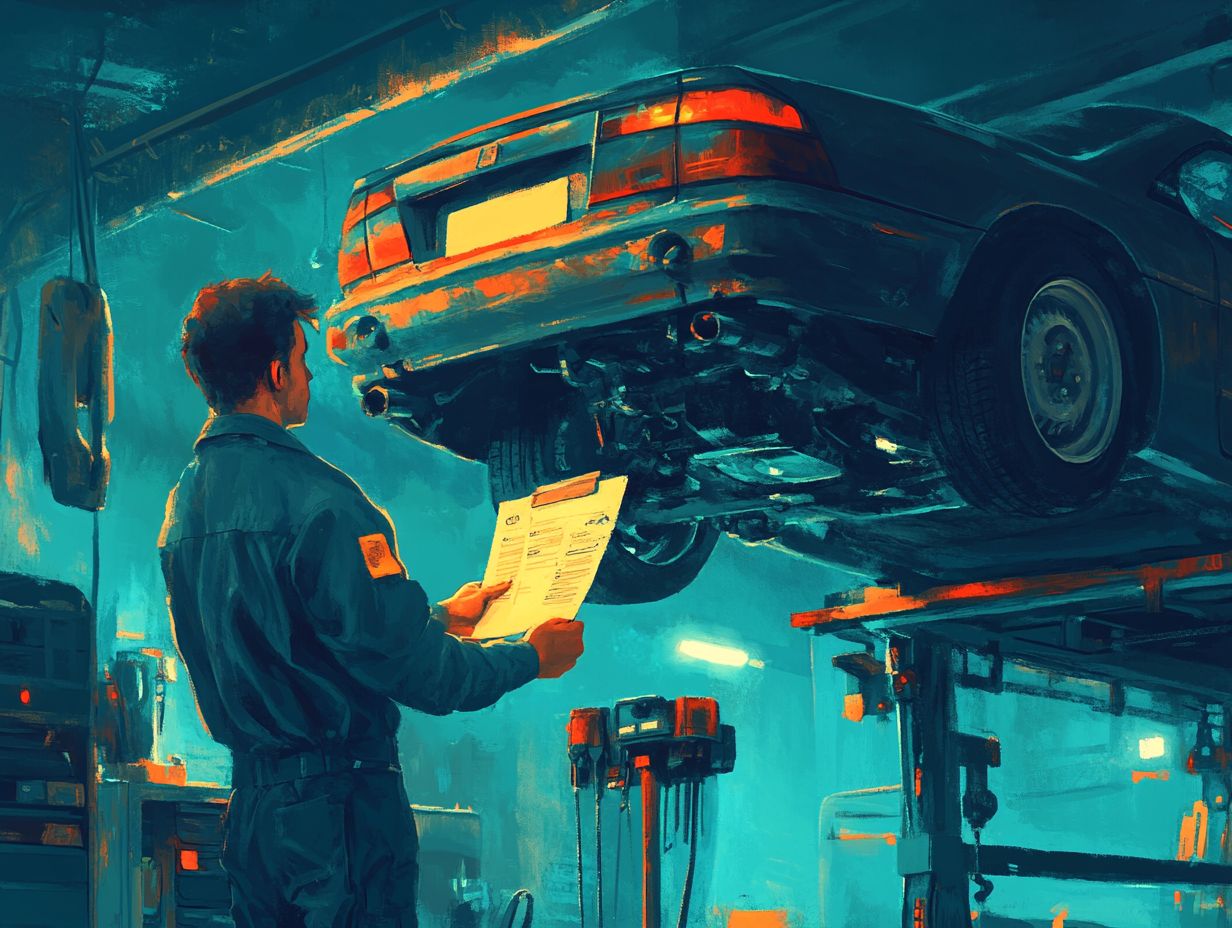
Safety concerns found during inspections can greatly affect drivers and passengers. Problems like broken lights, faulty seat belts, and windshield cracks need immediate attention.
Identifying these issues is crucial to prevent accidents and keep your vehicle roadworthy. Neglecting them can lead to serious injuries or fatalities.
Every part of your vehicle, from brakes to tires, affects safety. Inspections help you spot hazards and ensure safe operation in various conditions.
Regular inspections help you meet legal requirements and prioritize your safety, along with that of others on the road.
How to Prepare for a Car Inspection
Preparing for a car inspection requires a few essential steps. This ensures a smooth experience that uncovers any potential issues.
Bring your vehicle registration, proof of insurance, and maintenance records. Familiarize yourself with the inspection process to ease any worries.
What to Bring and What to Expect
When preparing for an inspection, have all necessary documents ready. This includes vehicle registration and proof of insurance.
Knowing what to expect can make the process less intimidating. Mechanics typically examine key areas like tire condition and brake performance.
In addition to these documents, gather maintenance records to show your commitment to regular servicing.
During the inspection, professionals will assess not just the exterior condition like the body and lights but also the engine’s performance and emissions systems. This thorough review ensures your vehicle is safe and ready for the road.
Being prepared with the right documents and understanding the process helps you approach the inspection confidently, minimizing surprises.
Tips for Choosing a Reliable Mechanic
Choosing a reliable mechanic is vital for top-notch inspections and maintenance. Consider the mechanic s qualifications, experience, and community reputation.
Informed choices lead to better care for your vehicle and enhance your safety on the road.
Qualifications to Look For
When searching for a reliable mechanic, certain qualifications are essential to guarantee quality service, especially during vehicle inspections. Look for certifications from recognized automotive organizations, as these indicate that the mechanic has undergone rigorous training and possesses the necessary skills for thorough vehicle evaluations.
Experience in handling various mechanical components is also a significant asset. A well-qualified mechanic typically holds certifications from institutions like the National Institute for Automotive Service Excellence (ASE) or similar entities. These credentials validate their expertise and ensure they stay updated on industry standards and emerging technologies.
Hands-on experience accumulated over years in diverse mechanical environments enables mechanics to diagnose issues accurately and recommend appropriate solutions. This combination of certification and experience enhances their competence and instills confidence in clients, ensuring that each inspection is performed with precision and care.
Questions to Ask
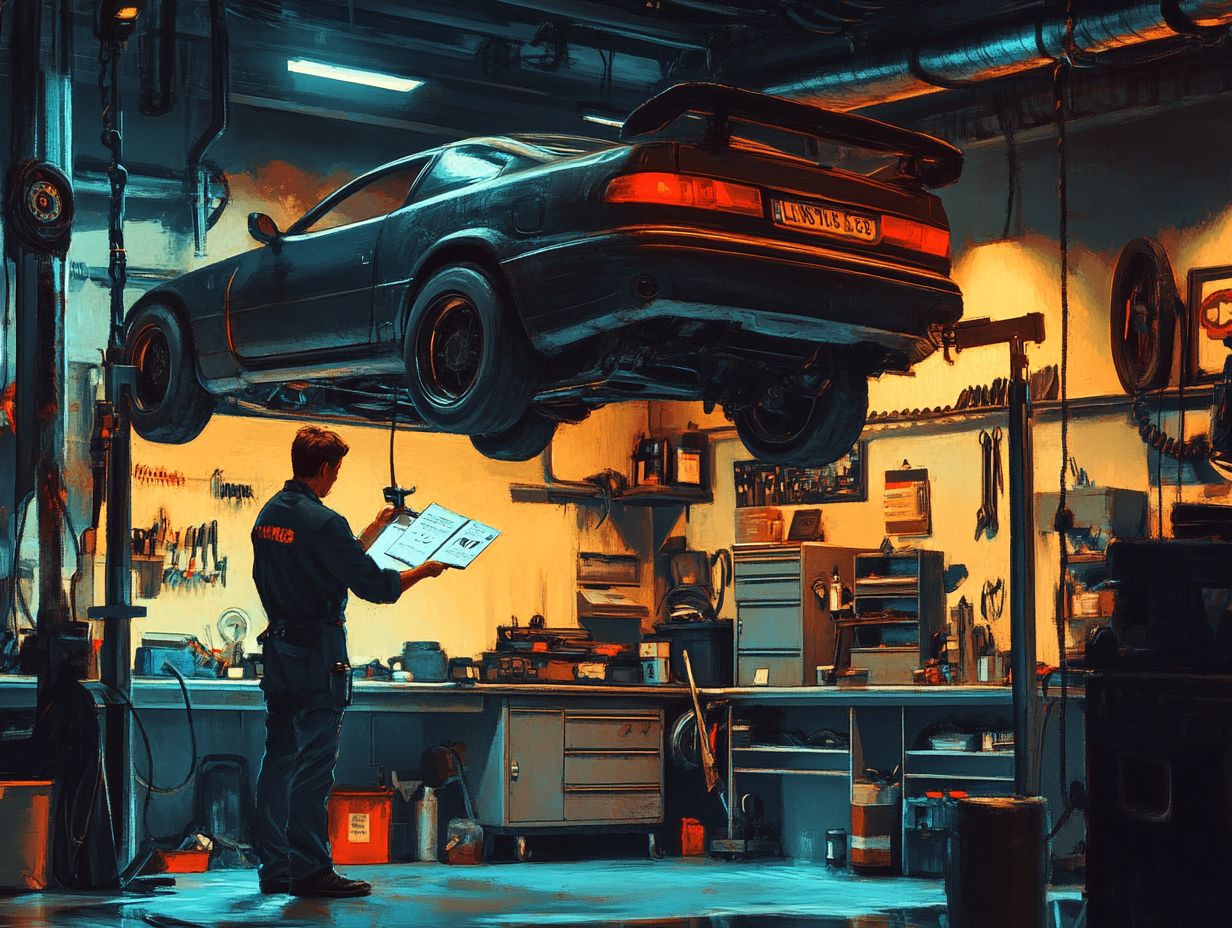
Asking the right questions when selecting a mechanic can uncover valuable insights into their capabilities and reliability, particularly regarding vehicle inspections.
Inquire about their qualifications and experience with specific issues such as brake performance or fluid leaks, along with the range of services they offer. Understanding their process during a safety inspection will help you evaluate their knowledge and trustworthiness.
Ask about the types of diagnostic devices the mechanic uses, as modern technology plays a crucial role in accurate assessments. Questions regarding warranty policies on both labor and parts can reveal the mechanic s commitment to quality and customer satisfaction.
Don’t forget to ask how often they pursue continuing education on new automotive technologies and regulations, which shows a proactive approach to staying updated.
Ultimately, these questions not only provide insight into their skill set but also help build a rapport that makes you feel more secure in your choice of service provider.
Preguntas Frecuentes
Cu l es el papel de un mec nico en las inspecciones de autom viles?
Un mec nico examina a fondo los diversos componentes del veh culo e identifica cualquier problema potencial o reparaciones necesarias.
Cu les son algunas responsabilidades clave de un mec nico durante una inspecci n de autom vil?
Las responsabilidades de un mec nico durante una inspecci n pueden incluir revisar el motor, los frenos, la suspensi n, los neum ticos y la seguridad general del veh culo, as como realizar pruebas de diagn stico y llevar a cabo el mantenimiento o las reparaciones necesarias.
Por qu es importante que un mec nico realice una inspecci n de autom vil?
Es crucial que un mec nico realice una inspecci n porque tienen el conocimiento, la experiencia y las herramientas necesarias para evaluar y diagnosticar a fondo cualquier problema potencial con el veh culo, asegurando su seguridad y funcionamiento adecuado.
Cu les son algunos problemas comunes que un mec nico puede encontrar durante una inspecci n de autom vil?
Algunos problemas comunes incluyen pastillas de freno desgastadas, fugas de fluidos, buj as defectuosas y neum ticos desgastados, entre otros.
Cu nto tiempo tarda t picamente un mec nico en completar una inspecci n de autom vil?
La duraci n de una inspecci n puede variar dependiendo del veh culo y su condici n, pero en promedio puede tardar entre 1 y 2 horas en completar una inspecci n exhaustiva.
Puede un mec nico recomendar reparaciones o mantenimiento durante una inspecci n de autom vil?
S , un mec nico puede recomendar reparaciones o mantenimiento necesario durante una inspecci n. Tambi n pueden proporcionar un informe detallado de sus hallazgos y sugerir servicios futuros necesarios para el veh culo.



